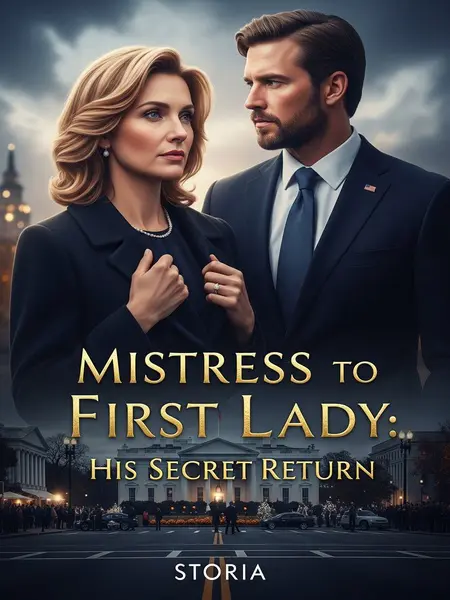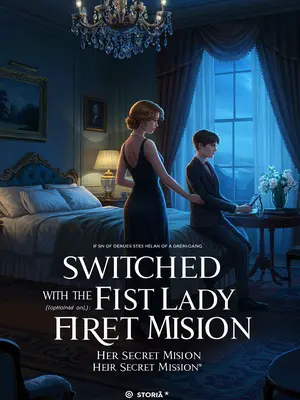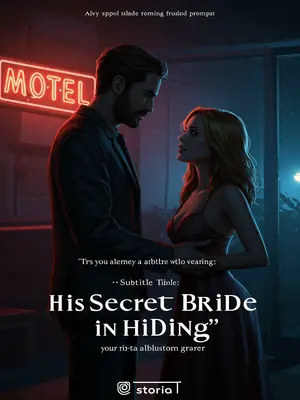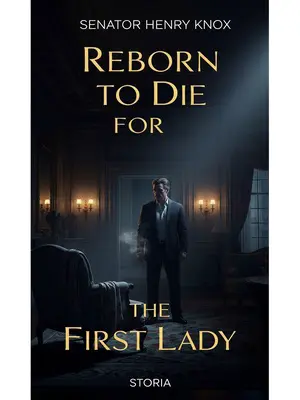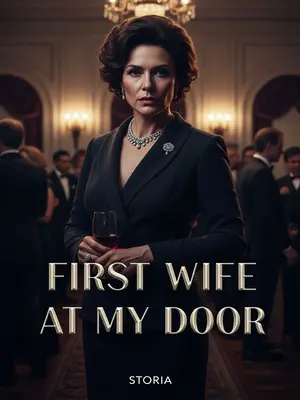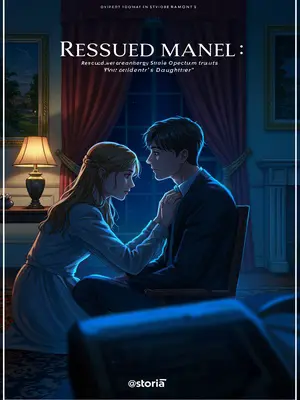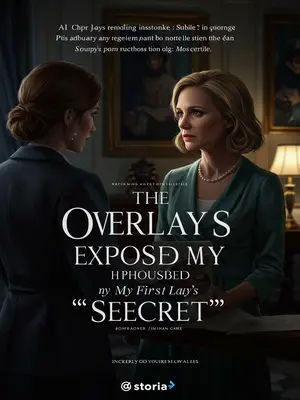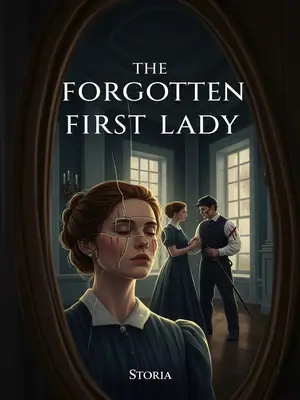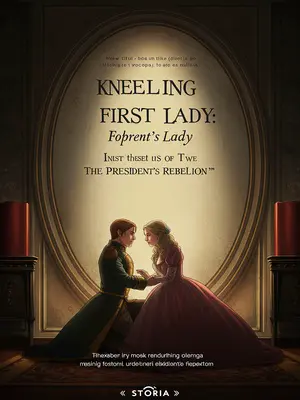Chapter 5: Moonlight on Old Scars
So I stayed in the West Wing.
The room was quiet, the air thick with unspoken words. I sat on the edge of the bed, unsure what to do next. I waited.
Jamie lay beside me.
He stretched out, arms behind his head, eyes closed. For a moment, he looked peaceful, almost happy. I almost reached out.
Between us was a clear dividing line made with the bedding.
He’d folded the comforter just so, a neat barrier between us. It was silly, but somehow comforting. Like old times.
At first I was a bit surprised, until Jamie raised his brows like it was only natural:
“Of course we sleep together.”
He grinned, eyes twinkling. “What, you think I’d let the President sleep on the couch?”
“Or do you expect me, the President, to sleep on the couch?”
He winked, the old mischief back in his voice. I rolled my eyes, but couldn’t help smiling. He always knew how to make me laugh.
I was speechless, deadpan.
I stared at him, trying not to laugh. Only Jamie could make a situation like this feel almost normal. Only him.
The night was very quiet.
The city outside was silent, the only sound the distant hum of traffic. I lay awake, listening to Jamie’s breathing, wondering what tomorrow would bring. Anything could happen.
I thought about a lot of things.
Memories crowded in—Maria’s laughter, Sebastian’s cold hands, the weight of everything I’d lost. I let them wash over me, too tired to fight. I missed them all.
I wondered what the estate was like now that I hadn’t returned for a night—was it chaos, or was nothing happening at all?
I pictured Mrs. Whitmore pacing the halls, Sebastian brooding in his study. The house would go on without me, just as it always had. I doubted they missed me.
Either way, Maria was probably so scared she couldn’t sleep all night.
I hoped she was safe, wherever she was. She deserved better than this. I wished I could help her.
I also thought, if only I’d landed here a few years older, maybe I’d be more mature and able to judge the situation better.
Maybe I’d have made different choices, found a way to survive without losing myself. Maybe. Or maybe not.
At the very least, I wouldn’t be like I am now—awkwardly hiding all my pain, almost unable to go on, but still pretending to be rational and friendly with Jamie.
I hated the mask I wore, but I didn’t know how to take it off. Sometimes I wondered if I ever would.
As my consciousness faded, a dull pain began to rise in my lower abdomen.
It started as a twinge, then grew sharper, until it was all I could feel. I gritted my teeth, trying not to make a sound. Just ride it out.
If there were a mirror in front of me, I’m sure I’d see my face as pale as death.
I imagined my reflection—hollow eyes, bloodless lips. I looked like a ghost, haunting my own life. I barely recognized myself.
I slowly opened my eyes, controlled my breathing, and turned my head to glance at Jamie.
He was still, his back to me, breathing slow and even. I watched him for a moment, longing to reach out but afraid to break the spell. He looked peaceful.
He was facing away from me, his breathing steady and deep—clearly asleep.
I envied his peace, wished I could borrow just a little of it for myself. Just for one night.
I quietly got up, carefully stepping over Jamie.
I moved as silently as I could, not wanting to wake him. My body felt heavy, every movement a struggle. I just needed to get out.
But just as I was about to get out of bed, my wrist was grabbed.
His hand shot out, strong and sure, catching me by surprise. I froze, heart racing. I hadn’t expected that.
Jamie, half-awake, spoke in a low, hoarse voice, distorted in the darkness.
His words were slurred, but the concern was clear. “Lillian,” he murmured, “where are you going?” I hesitated, not wanting to worry him.
The persistent pain had already made cold sweat break out on my forehead. Afraid I’d cry out, I waited a moment before patting his hand.
I forced a smile, hoping he couldn’t see how much I was hurting. He didn’t need to know.
“I’m going to change clothes.”
I tried to keep my voice steady, but it came out thin and shaky. I hoped he didn’t notice.
After a moment’s thought, I changed my wording:
“Just going to the bathroom.”
It was the truth, more or less. I needed a moment alone, a chance to breathe. Just a break.
Jamie grunted and let go.
His grip loosened, and I slipped away, grateful for the reprieve. I moved quickly.
I curled up and hurried out of the West Wing.
The halls were empty, the silence pressing in on me. I wrapped my arms around myself, trying to hold the pain at bay. I just needed a minute.
The night staff were alarmed, but after glancing at me, they didn’t react.
They knew better than to ask questions. I was just another ghost in the White House, passing through unnoticed. I liked it that way.
I picked up a sharp piece of broken tile from the ground and quickly hid in a corner of a side hall.
My hands shook as I gripped the tile, the cold edge biting into my skin. I pressed myself into the shadows, out of sight. No one would find me here.
Then, without hesitation, I stabbed the tile into my wrist, feeling the blood slowly seep out, and let out a relieved laugh.
The pain was sharp, cleansing. For a moment, it drowned out everything else—the memories, the fear, the loneliness. I closed my eyes and let the darkness take me. Just for a little while.
Two years ago, at the start of a bitter summer, I was tormented by the child in my belly, often throwing up everything I ate or drank, my chest burning with pain.
The days blurred together—nausea, fever, exhaustion. I spent hours curled up in bed, praying for relief that never came. Sometimes I wondered if it ever would.
Maria said that when I was exhausted and asleep, I often cried and called out names in my dreams.
She’d sit by my bedside, cool cloth pressed to my forehead, whispering soothing words. Sometimes I’d wake to find her holding my hand, tears in her eyes. She never left me.
She knelt on the floor, face pale and trembling as she listed names, finally clutching her hands and saying:
“Anyway… it didn’t sound like you were calling for the Senator.”
Her voice was soft, almost apologetic. I knew she meant well, but it only made the ache worse. I wished she’d stop.
I smiled weakly and told her to get up.
I reached out, brushing her hair back from her face. “It’s okay, Maria. You don’t have to worry about me.” I tried to sound convincing.
At that time, I called for my mom, my dad, even my always-smiling high school teacher… and also Jamie.
The names tumbled out in my dreams, a litany of people I’d lost. Jamie’s name was always last, whispered like a prayer. I missed them all.
I always thought I was lucky, born and raised in a happy middle-class bubble, given love and freedom in my education.
My childhood was golden—sunny afternoons, laughter echoing through the house, parents who loved me fiercely. I never imagined I’d lose it all. Sometimes I still can’t believe it.
The only hardship I ever suffered in nineteen years was that hopeless crush on Jamie.
It seemed so small now, compared to everything else. But back then, it felt like the end of the world. Funny how things change.
Little did I know, the nausea and pain of pregnancy was already unbearable.
I’d never felt so weak, so helpless. Every day was a battle just to keep breathing. I almost gave up.
Luckily, Sebastian didn’t let me suffer long. One ordinary night, he had the kitchen send over a bowl of soup.
I drank it without thinking, grateful for the warmth. I didn’t realize until later what he’d done. I should have known better.
That night I suddenly fell into a nightmare, unable to sleep.
My body convulsed, pain tearing through me. I clung to the sheets, gasping for air. The world spun.
When I finally woke, Maria lifted my blanket and saw a pool of blood beneath me. She fainted in fright.
The sight was so shocking, so final. I screamed for help, but no one came. No one ever did.
That was my first miscarriage.
I lay in bed for days, numb and broken. The world moved on, but I was stuck in that moment, unable to escape. I felt hollow.
The second time, Mrs. Whitmore was in favor, and with Sebastian’s silent consent, she personally brought me a cup of bitter tea, smiling sweetly.
Her smile was poison, her words honeyed lies. I drank the tea, knowing what it meant, but too tired to fight. I just wanted it to be over.
I smiled, took the tea with some shortbread cookies, and slowly drank it all.
The taste was bitter, but I forced it down. Maria wept silently beside me, unable to stop what was coming. There was nothing she could do.
Maria cried herself hoarse, clutching my clothes, saying I was foolish.
She begged me to run, to fight, to do anything but give in. But I was too far gone, too tired to care. I just wanted peace.
I gently patted her head and said I never wanted a child anyway.
It was a lie, but it made things easier—for both of us. I couldn’t bear to see her cry.
Then I took a wooden box from under my pillow, pulled out a stack of notebook paper covered in poetry and fairy tales for bedtime stories.
They were all I had left of hope—stories I’d written for a child who would never be born. I wanted them to mean something.
I threw them all into the fireplace, watching them burn until nothing remained.
The flames devoured the pages, turning dreams to ash. I watched, unblinking, until the last scrap was gone. There was nothing left.
Poor thing, my baby.
I said this in my heart. I hoped it was enough.
A silent goodbye, whispered into the darkness.
After that, my body was left with a chronic illness—at first, frequent high fevers at night; later, stabbing pains that came and went.
The doctors had no answers, no cures. I learned to live with the pain, to hide it as best I could. That was my life now.
It started in my lower abdomen and spread, wrapping around my heart.
Some days, it felt like I was being crushed from the inside out. But I kept going, because what else could I do? Giving up wasn’t an option.
There was no morphine here, no painkillers—only another kind of bleeding to temporarily distract me.
I learned to cope in my own way, seeking relief wherever I could find it. Sometimes, that meant hurting myself. Sometimes, it meant just surviving.
Moonlight poured in through the window, shining on my wrist, covered in deep and shallow scars.
The scars were a map of my survival, each one a reminder of what I’d endured. I traced them with my fingers, promising myself that one day, things would be different. One day.
Outside, the city slept, oblivious to my pain. But I was still here—still fighting, still hoping, still alive. That had to count for something.
